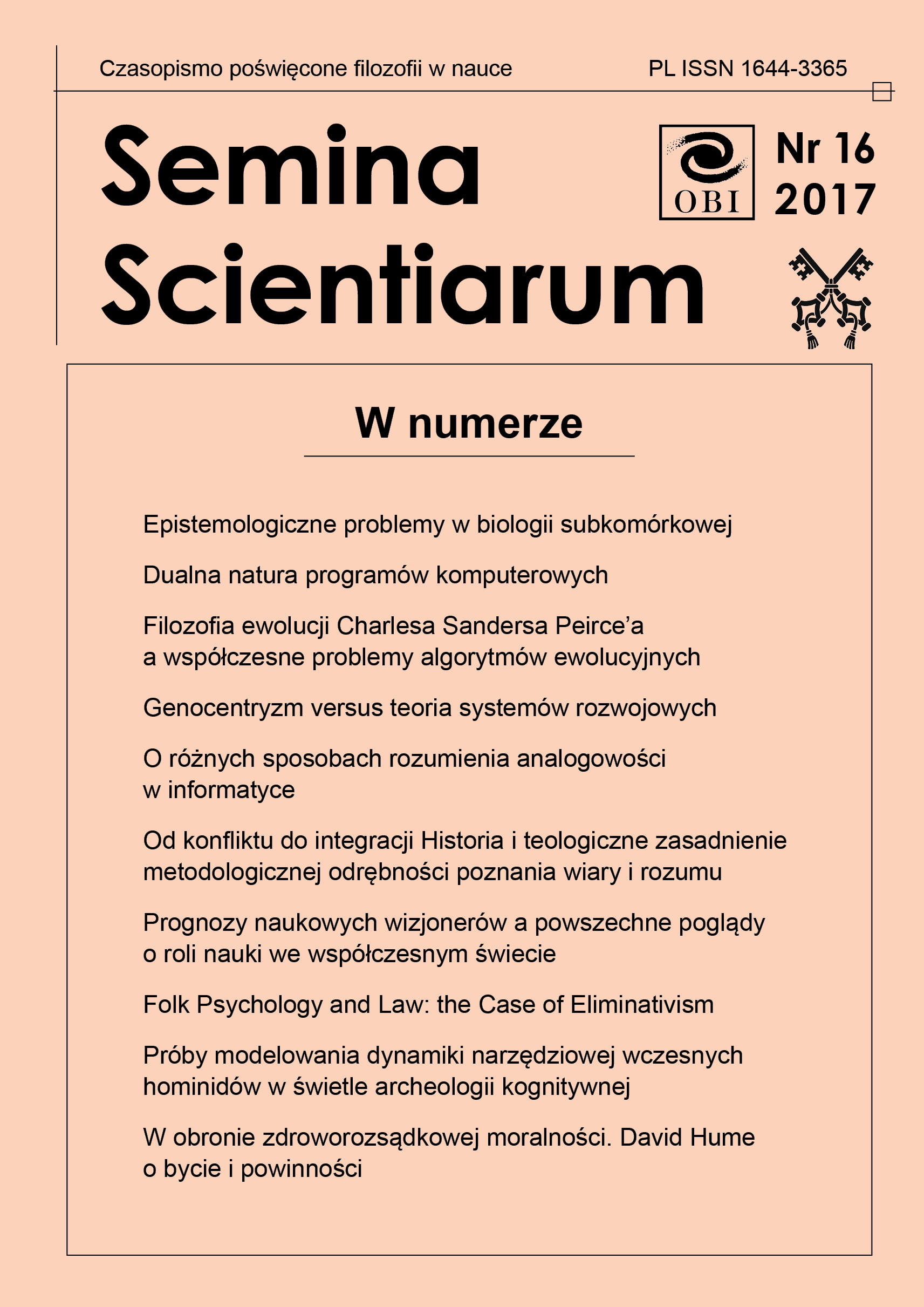Folk Psychology and Law: the Case of Eliminativism
DOI:
https://doi.org/10.15633/ss.2489Słowa kluczowe:
folk psychology, eliminativism, legal philosophy, philosophy of mindAbstrakt
The aim of this paper is very modest. First, we want to assess how different
strategies of naturalization might deal with the need of using folk psychology
in legal domain. Second, we want to check whether folk psychology is indeed
indispensable in the legal domain. Third, we want to describe possible problems
with one strategy of naturalization, i.e. radical naturalization with classical
elimination. Our conclusion will be that despite various attempts, every project
of naturalization of law will have to resolve the tension between law and folk
psychology and such resolution would not be achieved by simple reduction or
elimination of folk psychology. A variety of non-standard solutions might be in
place to resolve this tension. We will only outline those strategies here.
Bibliografia
Brożek B., O naturalizacji prawa, in: Naturalizm prawniczy. Interpretacje,
red. J. Stelmach, B. Brożek, Ł. Kurek, K. Eliasz, Warszawa 2015.
Churchland P., Eliminative Materialism and the Propositional Attitudes, “The
Journal of Philosophy” 78.2 (1981), p. 67–90.
Corns J., Pain Eliminativism: Scientific and Traditional, “Synthese” 193.9
(2016), p. 2949–2971.
Fodor J., Psychosemantics, Cambridge 1987.
Fodor J., The Language of Thought, vol. 5, Cambridge 1975.
Gawthorne D., Fictionalising Jurisprudence: An Introduction to Strong Legal
Fictionalism, “Australian Journal of Legal Philosophy” 38 (2013), p. 52–73.
Gordon R. M., Folk Psychology as Simulation, “Mind & Language” 1 (1986)
no. 2, p. 158–171.
Kim J., Mind in a Physical World: An Essay on the Mind-Body Problem and
Mental Causation, Cambridge 2000.
Lewis D., How to Define Theoretical Terms, “The Journal of Philosophy” 67.13
(1970), p. 427–446.
Lewis D., Reduction of Mind, in: A Companion to Philosophy of Mind, ed.
S. Guttenplan, Oxford 1966, p. 412–31.
Machery E., Doing without Concepts, Oxford 2009.
Marmor A., Law as Authoritative Fiction, “Cornell Legal Studies Research
Paper” 17–10 (2017), https://papers.ssrn.com/sol3/papers.cfm?abstract_
id=2921943 (28.11.2017).
Ravenscroft I., Folk Psychology as a Theory, in: The Stanford Encyclopedia
of Philosophy, ed. E. N. Zalta, https://plato.stanford.edu/archives/fall2016/
entries/folkpsych-theory (22.11.2017).
Schwitzgebel E., A Dispositional Approach to Attitudes: Thinking outside of
the Belief Box, “New Essays on Belief” (2013), p. 75−99.
Sellars W., Philosophy and the Scientific Image of Man, in: Frontiers of Science
and Philosophy, ed. R. Colodny, Pittsburgh 1962, p. 35–78.
Sifferd K., Psychology and the Criminal Law, London 2004.
Stich S., From Folk Psychology to Cognitive Science: The Case against Belief,
Cambridge 1983.
Stich S., Ravenscroft I., What Is Folk Psychology?, “Cognition” 50.1 (1994), p. 447.
Pobrania
Opublikowane
Numer
Dział
Licencja
Twórca oświadcza, że przysługują mu prawa autorskie do utworu i że nie są ograniczone w zakresie objętym niniejszym oświadczeniem oraz że utwór jest dziełem oryginalnym i nie narusza praw autorskich innych osób.
Twórca zezwala Uniwersytetowi Papieskiemu Jana Pawła II w Krakowie na nieodpłatne, niewyłączne i nieograniczone w czasie korzystanie z utworu, to jest:
- utrwalanie i zwielokrotnianie: wytwarzanie egzemplarzy utworu techniką drukarską, reprograficzną, zapisu magnetycznego oraz techniką cyfrową;
- obrotu oryginałem albo egzemplarzami, na których utwór utrwalono (wprowadzanie do obrotu, użyczenie lub najem oryginału albo egzemplarzy, publiczne wystawienie, wyświetlenie, a także publiczne udostępnianie utworu w taki sposób, aby każdy mógł mieć do niego dostęp w miejscu i w czasie przez siebie wybranym);
- włączenie utworu w skład utworu zbiorowego;
- udzielanie przez Uniwersytet Papieski Jana Pawła II w Krakowie sublicencji Creative Commons Uznanie autorstwa-Użycie niekomercyjne-Bez utworów zależnych 3.0 Polska
Uniwersytet Papieski Jana Pawła II w Krakowie udostępnia utwór na Platformie Czasopism należącej do uczelni, na licencji Creative Commons Uznanie autorstwa-Użycie niekomercyjne-Bez utworów zależnych 3.0 Polska. Tym samym uprawnia wszystkich zainteresowanych do korzystania z utworu pod następującymi warunkami:
- zostanie podany autor i tytuł utworu,
- zostanie podane miejsce publikacji (tytuł czasopisma i adres internetowy do oryginalnie opublikowanego utworu),
- utwór będzie dystrybuowany w sposób niekomercyjny,
- nie będą tworzone utwory zależne.

